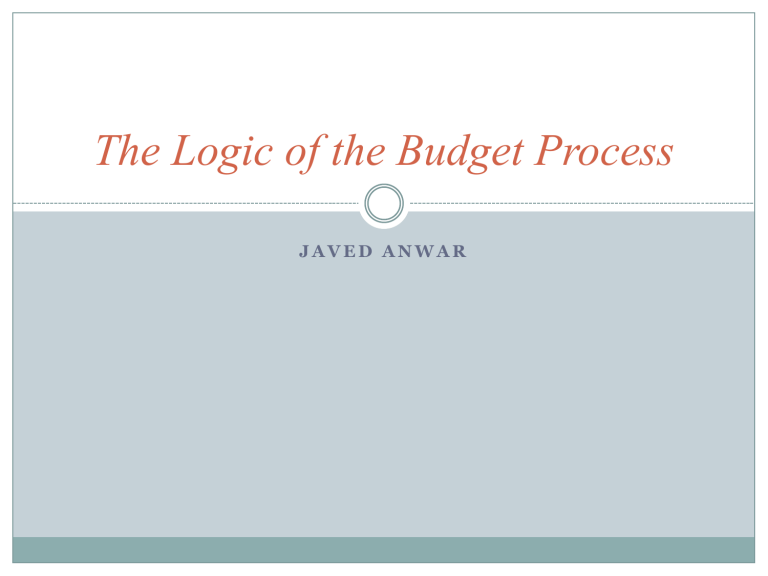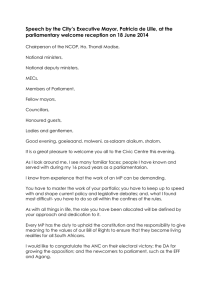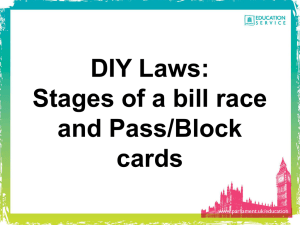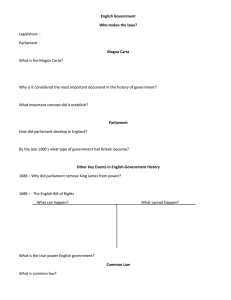Budget Process Logic: Transparency & Parliamentary Roles
advertisement

The Logic of the Budget Process JAVED ANWAR The Logic of the Budget Process A Budget is a Spending Plan Importance of the National Budget The budget is not just a technical instrument compiling income and expenditure. It is the most important policy statement made by the Executive in the course of the year. It reflects the fundamental values underlying national policy. It outlines the government's views of the socio-economic state of the nation. The budget is governments’ most important economic policy tool. Public budgets translate; government’s policies political commitments revenue collection expenditure of funds to meet the country’s competing needs Importance of the Budget Contd It is a declaration of the government's fiscal, financial and economic objectives and reflects its social and economic priorities. The budget further provides a valuable measure of the government's future intentions and past performance. A budget is a government’s plan for the use of public resources to meet the citizens’ needs. Key Budget Documents and Openness ENGENDERING TRANSPARENCY IN BUDGETS Pre- budget statement Publication of economic assumptions and fiscal risk Multi-year framework Improved budget documentation Publication of assumptions and parameters Comprehensive coverage / scope Mid-year report Actual spending information Sectoral performance information Useful classifications Timely and accessible audit reports Reporting on achievements of spending Information on priorities & objectives Strategic direction of policy Drafting Source: Idasa Legislative Stage Oversight and accountability Budget Execution Audit Stage Recent Trends in Open Budgeting Recent Trends in Open Budgeting Based on the Open Budget Survey for 2012 done by IBP, and released on 23 January, 2013 budget transparency remains weak globally;, 77 countries of the 100 surveyed fail to meet the basic standards of budget transparency, yet the same countries host 50% of the world’s population;, It also notes that governments publish less than 50% of required budget data, and only 23% of the countries surveyed provide citizens with comprehensive budget information, whilst 21 do not even publish the Executive’s budget proposal;, Slow improvement in budget openness – 20% increase in budget transparency scores in 40 countries: 2006 – 2012. Recent Trends in Open Budgeting According to OBI 2012, Bolivia, China, Equatorial Guinea, Myanmar, Qatar, Egypt, Sri – Lanka, and Zambia are the worst performers. Notable improvements have been noted Afghanistan, Sao – Tome, Philippines. for: Honduras, Limited opportunities for public/ civic engagement in the budget process;, Weak oversight institutional capacity, - Supreme Audit Institutions (SAI), Legislature – powers and independence. Table 1: Open Budget Index (OBI) Scores for 2012 COUNTRY PUBLIC ENGAGEM ENT LEGISLATI SAI OVERAL VE STRENGT SCORE STRENGTH H Angola 6 18 25 28 Botswana 19 58 100 50 Malawi 57 42 52 36 25 47 30 67 55 58 88 75 90 14 33 50 4 Zimbabwe 17 23 25 20 19 Mozambiq 8 ue Namibia 3 South Africa Zambia PARLIAMENT ‘S ROLE TOWARDS TRANSPARENCY IN THE BUDGET PROCESS What is Parliament? An elected representative body having supreme legislative powers within a state As the elected body that represents society in all its diversity, parliaments have a unique responsibility for reconciling the conflicting interests and expectations of different groups and communities through the democratic means of dialogue and compromise IPU Definition “A Parliament is a generic term depicting a representative body of individuals to whom the people have entrusted the responsibility of representing them by laying down the legal framework within which society shall be governed and seeing to it that these legal conditions are implemented in a responsible manner by the Executive”. Role of Parliament Three core functions of Law-Making, Oversight and Representation. Parliament exercises oversight mainly through the budget process In carrying out these tasks, Parliament works together with associations of civic society, and has the distinctive responsibility of safeguarding the individual democratic rights of citizens It can only do all this, if it observes democratic norms, by showing itself open, accessible and accountable to the electorate in its mode of operation. Role of Parliament If Parliament can play its role in the budget process it can assert its 3 roles discussed earlier;, Parliaments must enact laws that ensure civic participation in the budget process – Public finance reforms;, Aspirations of the electorate must be seen in the budget eventually approved by Parliament;, Monitoring of public expenditure by the legislature - Oversight Why a participatory budget process Participation in budget process powerful tool for representation and accountability Demonstrates importance of strategic engagement with the State for promoting a people-centric democratic discourse Powerful tool to complement other important accountability tools such as elections, mass mobilisation and protests Budget Process Emphasis is on meaningful participation by Parliament in the entire process Entire process defined as follows:- 1. Formulation/Crafting of the Budget Debate and Approval in the House Monitoring Implementation/Execution Budget Audit 2. 3. 4. of the The Budget arena CIVIL SOCIETY PARLIAMENT . Legislative accountabilit y External oversight and audit Budget formulation Budget process Budget execution Legislative oversight GOVERNME NT Budget review and adoption Legislati ve scrutiny The Budget Cycle Parliamentary Rules and Practices Budget brought to Parliament in the form of Appropriation Bill and Finance Bill These money Bills go through the same stages just like any other bills – 1st Reading, 2nd Reading, Committee Stage and 3rd Reading Depending on the Political Governance system – Parliamentary, Presidential etc – Standing Rules and Orders;, Budget amendment powers, time for budget debate;, Tools and Approaches 1. 2. 3. 4. 5. 6. Fuller understanding of parliamentary rules and procedures governing the budget process Full knowledge of the policy and legal framework governing the budget process and public finance management Engagement of parliamentary committees and influential MPs Building strong coalitions Capacity Building Online parliamentary engagement Legal and Policy Framework The key statutes are the Constitution, Public Finance Management Act, Finance Acts, and the Audit Office Act Budget process calendar, and actors mapped in some of these legal statutes; Independence of Oversight Bodies – Legislature, Supreme Audit Institutions, Legal space availed to non state actors – communitybased organizations (CSOs), Civil society organizations (CSOs), etc;, Responsibility opening budgets to the public rests with each government – country contexts – e.g PFM reforms; Experiences - Pan African context In Uganda, South Africa and Kenya budget policy statements presented to Parliament at least three months before tabling of the national budget In South Africa, Parliament has amendment powers on both budget statement and estimates of expenditure In Kenya Act gives budget committee 24 days to review and analyse the budget and report to Parliament In South Africa it is 16 days Engagement of parliamentary committees The key committees are Budget Committee and Public Accounts Committee Other portfolio committees are also important as they are legally required to scrutinise quarterly and monthly reports from ministries that they shadow Hearings are a good opportunity for civic and public input into the crafting of the budget Portfolio committees Important to fully understand the portfolio committee system Most of their meetings are open to CSOs and the public Their terms of reference legally empowers them to summon anyone to appear before them and give evidence, including the use of public funds They can inquire into any policy matters including the budget that falls within their jurisdiction Who has what influence, links and power in the committee? Building Coalitions Strong coalitions are essential to strengthen CSO advocacy on the budget process Develop relationships, partners and alliances throughout the parliamentary engagement process Related to that is engagement of the media. Which media and on what do we want to engage the media on? Research, analysis and proper packaging of information, materials and messages Capacity Building The key to successful engagement of Parliament on the budget process lies in addressing serious capacity gaps within civil society, the Executive and Parliament itself – Parliamentary Budget Office (PBO) initiatives –Zimbabwe, Malawi, South Africa, Zambia, Uganda, Nigeria, Kenya etc Organisational, technical and financial challenges Above all, political will and an environment conducive to productive engagement is a prerequisite Online Parliamentary Engagement Parliament is in the process of establishing a Parliamentary Budget Office This is a technical, independent and professional unit mandated with assisting MPs process large volumes of budgetary information Will have its own website and interface more with CSOs and the public Use of various social media platforms to engage on the budget with influential MPs






